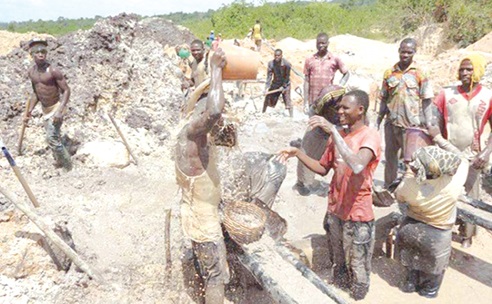
Election 2024: The galamsey problem
The Ghana Water Company Limited (Central Region) letter dated August 30, 2024 draws attention to the effects of illegal small-scale mining, popularly called ‘galamsey.’ The contents remind us of the devastation of ‘galamsey’.
In October 2022, I wrote about this and addressed the a) economic incentive structure which encourages it; b) various policy attempts by different governments to deal with it; and c) politics of the issue.
It is an election year. Let us examine two things about ‘galamsey’ – a) public attitudes; and b) the politics.
Public Attitudes – Insights from Afrobarometer Round 7, 2017.
In the survey, as many as eight out of 10 (77%) Ghanaians agreed or strongly agreed that “Illegal small-scale mining or ‘galamsey’ was prohibited by the law and citizens should not engage in it for any reason.”
Given the structure of economic incentives driving ‘galamsey’, I probed the data further to see whether economic circumstances affect public attitudes about it. Here is what I gleaned from further analysis of the data:
1. Among those who described the country’s living conditions as “fairly bad/very bad”, eight out of 10 (76%) agreed or strongly agreed that “citizens should not engage in it for any reason.”
2. Among those who indicated experiencing cash income deprivation (several times/many times/always) over a twelve-month period, seven out of 10 (72%) said “citizens should not engage in it for any reason.”
3. Among those who indicated going without basic necessities at least once a month over a twelve-month period, seven out of 10 (73%) said “citizens should not engage in it for any reason.”
There is another important dimension to the public’s attitudes. The risky activity, although illegal, serves as a source of livelihood for persons who engage in it. The reality is that stopping ‘galamsey’ means depriving people of their source of livelihood. What does the public expect the government to do under these circumstances?
The survey results further showed that nine out of 10 Ghanaians (85%) agree/strongly agree that “the government should be responsible for providing alternative livelihoods for Ghanaians who are currently engaged in illegal small-scale mining or ‘galamsey.’”
Among those described above as feeling various economic pinch points, the sentiment is the same. Strong majorities (87%) want the government to be responsible for providing alternative livelihoods for persons engaged in ‘galamsey.’
Finally, how does the public rate the government’s fight against this issue? From the survey results, eighty-six per cent (86%) rated the government’s efforts well.
However, the CDD-Ghana pre-election survey (October 2020), showed 59 per cent rating the government’s efforts well.
The public’s attitudes can be summarised as follows– a) citizens should not engage in ‘galamsey’; b) economic challenges notwithstanding, citizens should still not engage in ‘galamsey’; c) government should be responsible for providing alternative livelihoods for persons engaged in ‘galamsey’ and d) approval of government’s efforts in dealing with ‘galamsey’ has declined.
Promising to fight ‘galamsey’ – A political dilemma?
In response to the GWCL’s letter, Prof. H. Kwesi Prempeh, Executive Director of CDD-Ghana wrote the following on social media – “Ghana Water continues to cry in vain for help from those with responsibility for solving the Galamsey problem.
Or do I hear that the problem has become politically insoluble?”
A politically insoluble problem suggests there is nothing our public officials (elected, appointed, bureaucrats, etc.) can reasonably do to stop this menace. And they are unable to, in my opinion, because of two reasons, – a) inability to build bipartisan consensus on the issue; and b) fear of political backlash from voters in ‘galamsey’ areas.
For the sake of the potential consequences of ‘galamsey’, some of which is already surfacing, I hope this issue does not stay a permanently politically insoluble problem.
The NDC and NPP manifestos contain proposals aimed at bringing sanity to the small-scale mining sector. This tells me there is bipartisan recognition to do something about the problem.
However, there appears to be a conscious effort not to create the impression that if elected, these proposals are aimed at ending ‘galamsey.’ Perhaps there is a fear of political backlash from voters in ‘galamsey’ areas hence this cautious approach?
The proposals appear to give assurances of government support and regularising the activity through a combination of improved practices, greater oversight and strengthened regulation. For a state with weak regulatory capacity, it remains to be seen how these proposals will remedy the situation.
The public attitudes do provide enough political support to deal with this issue. ‘Galamsey’ may be a locally situated problem in mining areas, but it effects are national.
In the short term, the politics may offer perverse incentives leading to how carefully political parties address it in an election year. But for how long will the short-term perverse political incentives drive our anti ‘galamsey’ efforts?
The writer is Project Director, Democracy Project.
